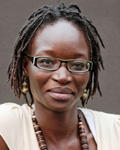2014
Amy Niang
- Lecturer
- University of Witwatersrand

Abstract
The projected book argues that the history of the Mossi state (16-19C) is characterized by a battle of representations between Naam (political authority), a homogenisation and hierarchisation project on one hand, and Tenga (earth priesthood) articulated around a notion of social morality and order. The success of the centralised state model resulted from a double process whereby internal dissent against the state model, in the form of open rebellion or silent defiance was often framed in the language of the state, so much so that alternative reconstructions of/against the state seemed to remain within the dominant order. The book therefore offers an alternative reading of African state formation—and subsequent institutional struggles, from internal, rather than external dynamics.

